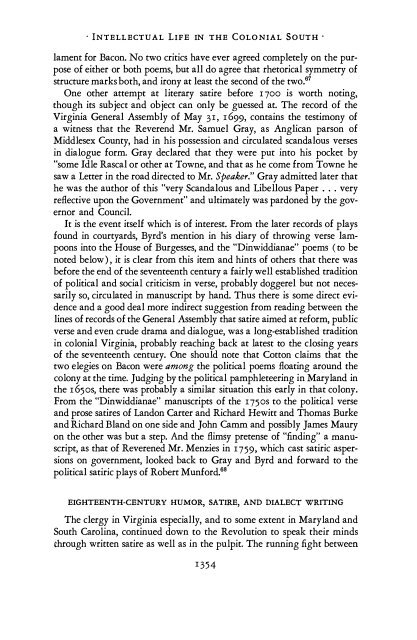Literature, Principally Belletristic - University of Tennessee, Knoxville
Literature, Principally Belletristic - University of Tennessee, Knoxville
Literature, Principally Belletristic - University of Tennessee, Knoxville
You also want an ePaper? Increase the reach of your titles
YUMPU automatically turns print PDFs into web optimized ePapers that Google loves.
· INTELLECTUAL LIFE IN THE COLONIAL SOUTH ·<br />
lament for Bacon. No two critics have ever agreed completely on the purpose<br />
<strong>of</strong> either or both poems, but all do agree that rhetorical symmetry <strong>of</strong><br />
structure marks both, and irony at least the second <strong>of</strong> the twO.67<br />
One other attempt at literary satire before 1700 is worth noting,<br />
though its subject and object can only be guessed at. The record <strong>of</strong> the<br />
Virginia General Assembly <strong>of</strong> May 31, 1699, contains the testimony <strong>of</strong><br />
a witness that the Reverend Mr. Samuel Gray, as Anglican parson <strong>of</strong><br />
Middlesex County, had in his possession and circulated scandalous verses<br />
in dialogue form. Gray declared that they were put into his pocket by<br />
"some Idle Rascal or other at Towne, and that as he come from Towne he<br />
saw a Letter in the road directed to Mr. Speaker." Gray admitted later that<br />
he was the author <strong>of</strong> this "very Scandalous and Libellous Paper ... very<br />
reflective upon the Government" and ultimately was pardoned by the governor<br />
and Council.<br />
It is the event itself which is <strong>of</strong> interest. From the later records <strong>of</strong> plays<br />
found in courtyards, Byrd's mention in his diary <strong>of</strong> throwing verse lampoons<br />
into the House <strong>of</strong> Burgesses, and the "Dinwiddianaeu poems (to be<br />
noted below ), it is clear from this item and hints <strong>of</strong> others that there was<br />
before the end <strong>of</strong> the seventeenth century a fairly well established tradition<br />
<strong>of</strong> political and social criticism in verse, probably doggerel but not necessarily<br />
so, circulated in manuscript by hand. Thus there is some direct evidence<br />
and a good deal more indirect suggestion from reading between the<br />
lines <strong>of</strong> records <strong>of</strong> the General Assembly that satire aimed at reform, public<br />
verse and even crude drama and dialogue, was a long-established tradition<br />
in colonial Virginia, probably reaching back at latest to the closing years<br />
<strong>of</strong> the seventeenth century. One should note that Cotton claims that the<br />
two elegies on Bacon were among the political poems floating around the<br />
colony at the time. Judging by the political pamphleteering in Maryland in<br />
the 1650S, there was probably a similar situation this early in that colony.<br />
From the uDinwiddianae" manuscripts <strong>of</strong> the I 7 50S to the political verse<br />
and prose satires <strong>of</strong> Landon Carter and Richard Hewitt and Thomas Burke<br />
and Richard Bland on one side and John Camm and possibly James Maury<br />
on the other was but a step. And the flimsy pretense <strong>of</strong> "finding" a manuscript,<br />
as that <strong>of</strong> Reverened Mr. Menzies in 1759, which cast satiric aspersions<br />
on government, looked back to Gray and Byrd and forward to the<br />
political satiric plays <strong>of</strong> Robert Munford.68<br />
EIGHTEENTH-CENTURY HUMOR , SATIRE , AND DIALECf WRITING<br />
The clergy in Virginia especially, and to some extent in Maryland and<br />
South Carolina, continued down to the Revolution to speak their minds<br />
through written satire as well as in the pulpit. The running fight between<br />
1354















